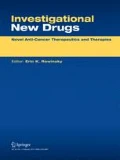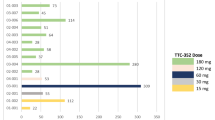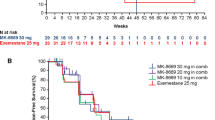Summary
Purpose: We report the first phase I trials of 2-methoxyestradiol (2ME2, Panzem® Capsules, EntreMed, Rockville, MD), alone and in combination with docetaxel, in patients with metastatic breast cancer (MBC).
Patients and methods: In Trial 001, 2ME2 monotherapy was administered orally once (200–1000 mg/d, cohorts 1–5) or twice daily (200–800 mg/q12h, cohorts 6–9) for 28 days followed by a 14-day observation period, continuously thereafter. In Trial 002, docetaxel 35 mg/m2 was administered weekly for four of six weeks for a maximum six cycles; 2ME2 (200–1000 mg/d) was given orally once daily for 28 days followed by a 13-day observation period in cycle one, continuously thereafter. In both trials, responding or stable patients continued 2ME2 until progression.
Results: Trial 001 enrolled 31 patients; there were no objective responses. Trial 002 enrolled 15 patients; ORR was 20% including one CR. There were no Grade IV toxicities; MTD was not reached in either study. When combined with docetaxel, three patients had significant transaminase elevations that returned to normal with continued treatment (in two of three patients). There was significant inter-patient variability and extensive metabolism to 2-methoxyestrone (2ME1). Steady-state AUC and trough concentrations of 2ME2 increased linearly up to 400–600 mg/d; doses above 400–600 mg/d did not increase 2ME2 levels. The target trough concentration (3–25 ng/mL) was not attained. Combined administration did not alter docetaxel or 2ME2 pharmacokinetics.
Conclusion: 2ME2, alone or in combination with docetaxel, was well tolerated in patients with MBC but systemic exposure remained below the expected therapeutic range.

Similar content being viewed by others
References
Folkman J (1990) What is the evidence that tumors are angiogenesis dependent? J Natl Cancer Inst 82:4–6
Gasparini G (1999) Angiogenesis in breast cancer. Role in biology, tumor progression, and prognosis. In: Bowcock A (ed) Breast cancer: Molecular Genetics, Pathogenesis, and Therapeutics. Humana Press Inc, Totowa, NJ, pp 347–371
Brem SS, Gullino PM, Medina D (1977) Angiogenesis: a marker for neoplastic transformation of mammary papillary hyperplasia. Science 195:880–882
Jensen HM, Chen I, DeVault MR et al (1982) Angiogenesis induced by “normal” human breast tissue: a probable marker for precancer. Science 218:293–295
McLeskey SW, Tobias CA, Vezza PR et al (1998) Tumor growth of FGF or VEGF transfected MCF-7 breast carcinoma cells correlates with density of specific microvessels independent of the transfected angiogenic factor. Am J Pathol 153:1993–2006
Weinstat-Saslow DL, Zabrenetzky VS, VanHoutte K et al (1994) Transfection of thrombospondin 1 complementary DNA into a human breast carcinoma cell line reduces primary tumor growth, metastatic potential, and angiogenesis. Cancer Res 54:6504–6511
McCulloch P, Choy A, Martin L (1995) Association between tumour angiogenesis and tumour cell shedding into effluent venous blood during breast cancer surgery [see comments]. Lancet 346:1334–1335
Fox S, Leek R, Bliss J et al (1997) Association of tumor angiogenesis with bone marrow micrometastases in breast cancer patients. J Natl Cancer Inst 89:1044–1049
Weidner N, Semple J, Welch W et al (1991) Tumor angiogenesis and metastasis—correlation in invasive breast cancer. N Engl J Med 324:1–8
Weidner N, Folkman J, Pozza F et al (1992) Tumor angiogenesis: a new significant and independent prognostic indicator in early stage breast carcinoma. J Natl Cancer Inst 84:1875–1887
Hansen S, Grabau D, Sorensen F et al (2000) The prognostic value of angiogenesis by Chalkley counting in a confirmatory study design on 836 breast cancer patients. Clin Cancer Res 6:139–146
Martucci C, Fishman J (1976) Uterine estrogen receptor binding of catecholestrogens and of estetrol (1,3,5(10)-estratriene-3,15a,16a,17b-tetrol). Steroids 27:325–333
Liu D, Bachmann KA (1998) An investigation of the relationship between estrogen, estrogen metabolites and blood cholesterol levels in ovariectomized rats. J Pharmacol Exp Ther 286:561–568
Martucci CP, Fishman J (1979) Impact of continuously administered catechol estrogens on uterine growth and luteinizing hormone secretion. Endocrinology 105:1288–1292
Liehr JG, Fang WF, Sirbasku DA et al (1986) Carcinogenicity of catechol estrogens in Syrian hamsters. J Steroid Biochem 24:353–356
Josefsson E, Tarkowski A (1997) Suppression of type II collagen-induced arthritis by the endogenous estrogen metabolite 2-methoxyestradiol. Arthritis Rheum 40:154–163
Schumacher G, Kataoka M, Roth J et al (1999) Potent antitumor activity of 2-methoxyestradiol in human pancreatic cancer cell lines. Clin Cancer Res 5:493–499
Klauber N, Parangi S, Flynn E et al (1997) Inhibition of angiogenesis and breast cancer in mice by the microtubule inhibitors 2-methoxyestradiol and Taxol. Cancer Res 57:81–86
Fotsis T, Zhang Y, Pepper MS et al (1994) The endogenous oestrogen metabolite 2-methoxyoestradiol inhibits angiogenesis and suppresses tumour growth. Nature 368:237–239
Yue T-L, Wang X, Louden C et al (1997) 2-methoxyestradiol, an endogenous estrogen metabolite, induces apoptosis in endothelial cells and inhibits angiogenesis: possible role for stress-activated protein kinase signaling pathway and fas activation. Molecular Pharmacol 51:951–962
Sweeney CJ, Miller KD, Sissons SE et al (2001) The antiangiogenic property of docetaxel is synergistic with a recombinant humanized monoclonal antibody against vascular endothelial growth factor or 2-Methoxyestradiol but antagonized by endothelial growth factors. Cancer Res 61:3369–3372
Yu H, Levesque MA, Clark GM et al (1998) Prognostic value of prostate-specific antigen for women with breast cancer: a large United States cohort study. Clin Cancer Res 4:1489–1497
Yu H, Levesque MA, Clark GM et al (1999) Enhanced prediction of breast cancer prognosis by evaluating expression of p53 and prostate-specific antigen in combination. Br J Cancer 81:490–495
Fortier AH, Nelson BJ, Grella DK et al (1999) Antiangiogenic activity of prostate-specific antigen. J Natl Cancer Inst 91:1635–1640
Heidtmann HH, Nettelbeck DM, Mingels A et al (1999) Generation of angiostatin-like fragments from plasminogen by prostate- specific antigen. Br J Cancer 81:1269–1273
Sweeney C, Liu G, Yiannoutsos C et al (2005) A phase II multicenter, randomized, double-blind, safety trial assessing the pharmacokinetics, pharmacodynamics, and efficacy of oral 2-methoxyestradiol capsules in hormone-refractory prostate cancer. Clin Cancer Res 11:6625–6633
Mooberry SL (2003) Mechanism of action of 2-methoxyestradiol: new developments. Drug Resist Updat 6:355–361
Miller KD, Trigo JM, Wheeler C et al (2005) A multicenter phase II trial of ZD6474, a vascular endothelial growth factor receptor-2 and epidermal growth factor receptor tyrosine kinase inhibitor, in patients with previously treated metastatic breast cancer. Clin Cancer Res 11:3369–3376
Loeffler T, Droege C, Hausamen T et al (1999) Dose-dense weekly docetaxel in metastatic breast cancer. Breast Cancer Res Treat 57:125
Burstein HJ, Manola J, Younger J et al (2000) Docetaxel administered on a weekly basis for metastatic breast cancer. J Clin Oncol 18:1212–1219
Fornasiero A, Danilel O, Ghiotto C et al (1999) Weekly docetaxel for metastatic breast cancer: A phase II trial. Breast Cancer Res Treat 57:127
Kim Y, Takatsuka Y, Tanigawara Y et al (2000) Weekly docetaxel for patients with recurrent breast cancer: clinical results and pharmacokinetic/pharmacodynamic assessment. Proc Am Soc Clin Oncol 19:113a
Mey U, Kleinschmidt R, Sauerbruch T et al (1999) A phase II trial of weekly docetaxel in patients with advanced metastatic breast cancer - preliminary results. Proc Am Soc Clin Oncol 18:134a
Miranda F, Burris H, Greco F et al (1999) Phase II trial of weekly docetaxel in the treatment of patients who are elderly or medically compromised: A Minnie Pearl Research Network Study. Proc Am Soc Clin Oncol 18:601a
Rittershaus A, Luck H, Scholz U et al (1999) Weekly docetaxel in pretreated patients with metastatic breast cancer. Breast Cancer Res Treat 57:126
Acknowledgments
Supported by the American Cancer Society grant # CRTG-00-199-01-CCE (KDM) a Career Development Award from the American Society of Clinical Oncology (KDM), Breast Cancer Research Foundation (GWS, KDM) and research supported by EntreMed, Inc.
Author information
Authors and Affiliations
Corresponding author
Rights and permissions
About this article
Cite this article
James, J., Murry, D.J., Treston, A.M. et al. Phase I safety, pharmacokinetic and pharmacodynamic studies of 2-methoxyestradiol alone or in combination with docetaxel in patients with locally recurrent or metastatic breast cancer. Invest New Drugs 25, 41–48 (2007). https://doi.org/10.1007/s10637-006-9008-5
Received:
Accepted:
Published:
Issue Date:
DOI: https://doi.org/10.1007/s10637-006-9008-5




